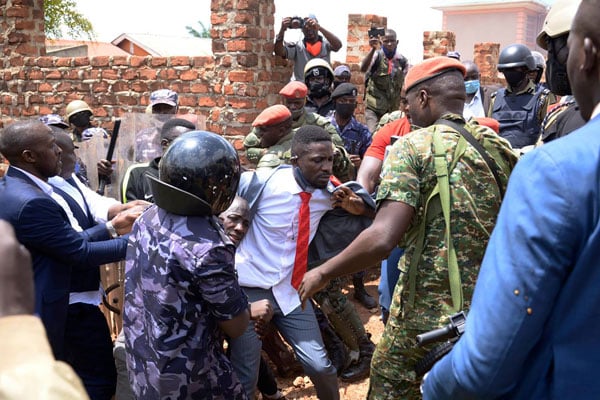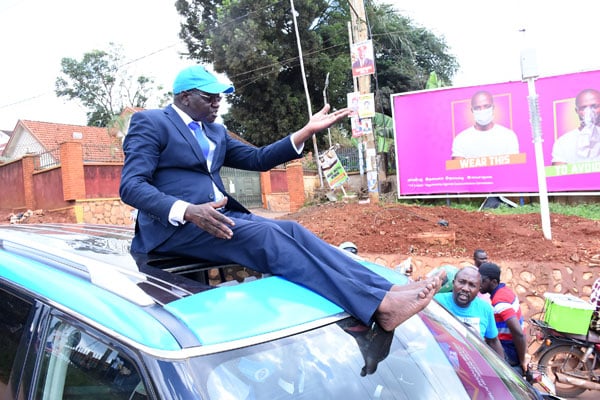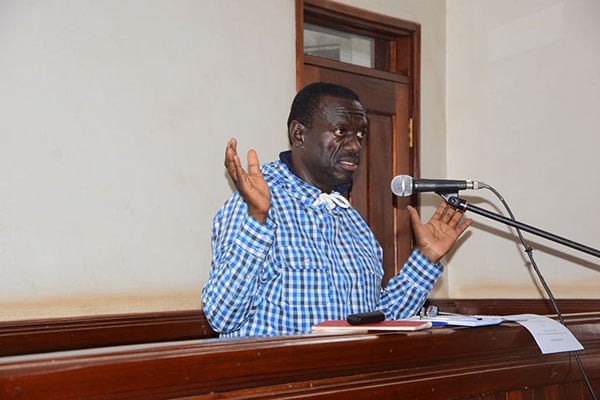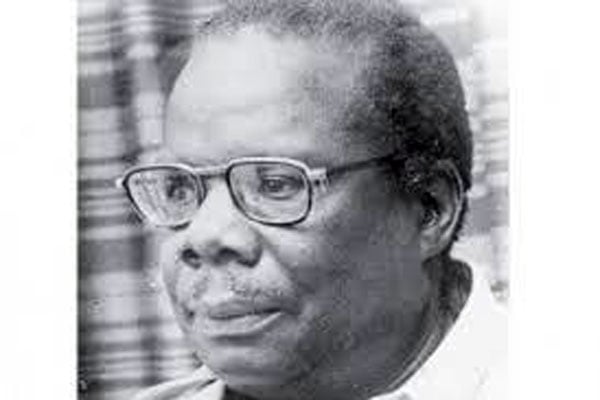Uganda elections drama: A history of campaign dirty tricks

Opposition politician Mr Robert Kyagulanyi was arrested by armed personnel after his nomination as Presidential candidate on Tuesday. PHOTO/ COURTESY
What you need to know:
The general elections are usually tumultuous in Uganda with the Opposition candidates facing an array of acts that derail their campaign. The Forum for Democratic Change (FDC) candidate Patrick Oboi Amuriat was helped by Police to the Nomination Centre at Kyambogo barefooted. Many saw this as a shame. Yet such acts of intimidation can be traced as far as the 1980 Presidential elections.
On Tuesday, the world was treated to dramatic scenes as Forum for Democratic Change’s (FDC’s) Presidential candidate, Mr Patrick Amuriat Oboi, was violently arrested from near the party’s offices in Najjanankumbi, and bundled into a police car.
The candidate was minutes later delivered to the Kyambogo University premises where the Electoral Commission (EC) had chosen to conduct the nomination of Presidential candidates.
At the Nomination Centre, Mr Amuriat emerged from the car without shoes. He walked with only his socks for a few minutes before he removed them too.
The police later issued a statement claiming that Mr Amuriat had been arrested because he had defied police’s instructions.
“…Amuriat blatantly defied the traffic flow plan agreed upon from his home in Najjera to Kyambogo. He instead opted to proceed to Najjanakumbi to lead a delegation of over 2,000 supporters in total disregard of the Electoral Commission and Health SOPs. He was, however, safely transported to Kyambogo,” Mr Fred Enanga, the spokesperson of the Police said in a statement issued late on Tuesday.
The police force had on October 31 designated a route that Mr Amuriat was supposed to use to travel from his home in Najjera to Kyambogo.
Mr Amuriat was left livid. He said that force had not taken into consideration the fact that he had to move with nomination documents and backers.
“I have come here forcefully, you can see I have no shoes.
I went to my headquarters to collect my papers. I have been forced to come here without papers, without a proposer, without a seconder and without the 10 people who should have been allowed to come. This is very very unbecoming and it’s a test case of whether the EC is prepared to ensure there is democracy,” Mr Amuriat told the media.
The same day, another Presidential candidate, Mr Robert Kyagulanyi alias Bobi Wine was arrested shortly after his nomination. The police explained away his arrest as another case of defiance.
“After his successful nomination, he had other similar plans of holding illegal processions from Kyambogo to Kamwokya at his NUP headquarters, which we countered due to its negative impact on the flow of traffic, public safety and public order. He was forcefully removed from his vehicle and a fracas ensued in the process of transferring him to the police vehicle. He was eventually delivered to his home in Magere.”
As part of the fallout from his arrest, Mr Kyagulanyi has since rejected the security detail that was assigned to him by the EC, saying that the team had failed in its first test by joining his tormentors during the course of his arrest.
Past cases - 1980
Until Tuesday’s event’s nominations ahead of the 1980 general elections had gone down as the most dramatic in Uganda’s checkered history.
By the close of nominations on November 25, 1980 the Uganda People’s Congress (UPC) had taken 15 seats in Karamoja, Lango, West Nile and Soroti unopposed.
DP candidates in those areas were either scared away or arrested at impromptu roadblocks, which made it impossible for them to present their nomination papers.

The Forum for Democratic Change (FDC) candidate Patrick Oboi Amuriat was helped by Police to the Nomination Centre at Kyambogo barefoot. Many saw this as a shame. Yet such acts of intimidation can be traced as far back as the 1980 Presidential election.
In West Nile where the UNLA was battling rebels of the Former Uganda National Army (FUNA) and the Uganda National Rescue Front (UNRF), it had been believed that there would be no voting on December 10, because of insecurity and lack of registers and voter registration, but on November 20 the EC announced via Radio Uganda that elections would be held, catching DP unawares.
The EC had announced that it would defer production of some requirements such as filing of tax clearance forms, but the Returning Officers (ROs) declined to receive nomination forms for those who did not have them.
The Chairman of the Military Commission, Mr Paulo Muwanga, decreed on December 9, 1980 that the outcomes of the nominations in West Nile could not be challenged in court. Through such machinations, the UPC got 17 more seats in parliament without breaking any sweat.
Not new – 2005 nominations
Tuesday’s arrests were the first time that presidential candidates have been arrested on nomination day, but it is not entirely the first time that we have had drama around nominations.
In December 2005, a day after the State Minister for Justice, Mr Adolf Mwesige, advised that a person who had not been convicted or sentenced could get nominated and that the nomination could take place in absentia, his boss, the Minister of Justice and Attorney General, Prof Khiddu Makubuya, wrote to the EC advising it against processing the nomination of the President of FDC, Col Dr Kizza Besigye.
“…Although he (Dr Besigye) is presumed innocent until proved guilty, it certainly cannot be said that he is on the same level of innocence as that of the other presidential candidates. Even if he is blameless, he is currently a subject of a serious charge of treason and concealment of treason in the High Court,” Prof Makubuya wrote.
At the time, Dr Besigye was battling treason and rape charges that were brought against him shortly after his return from self-imposed exile in South Africa. In charging him with treason, the state accused him of having links with both the People’s Redemption Army (RPA) and Joseph Kony’s Lord’s Resistance Army (LRA). The state alleged that he had, in 1997, raped one Joanita Kyakuwa, a daughter of a deceased colleague. The charges were two years later dismissed by Justice John Bosco Katutsi.
Prof Makubuya also insisted that a candidate could not be nominated in absentia.
“…a person intending to contest as a presidential candidate must be physically present at the Mandela National Stadium on one of the appointed days and times to submit his nomination papers signed by him and all other requirements mentioned,” he wrote.
The EC ignored Prof Makubuya’s advice and nominated Dr Besigye on December 15.
FDC officials who handed over his nomination papers to EC officials in Namboole put a colour poster of Dr Besigye on a chair, which they placed in their midst under a tent that had been set up on the pitch. On the chair was a baseball cap on which the words, “FDC: Let Freedom Ring” were inscribed.
The EU observer mission later issued a report in which it suggested that the charges could have been brought against Dr Besigye out of fear for his candidature.
“…President Museveni seemed afraid of Dr. Besigye’s candidacy despite his relatively positive track record in terms of economic growth and political stability. Dr. Besigye’s arrest and the charges brought against him should be seen, according to the same political experts, as a reflection of President Museveni’s worries,” the observers wrote in their final report.

Former FDC party Presidential flag bearer Dr Kizza Besigye in the dock at Nakawa Court in Kampala. The veteran politician was accused of multiple cases, including treason. PHOTO/ FILE
A new low
It is not clear whether it was because the 1980 elections were not direct, but Prof Paulo Wangoola, who contested on a DP ticket against the late former Secretary General of UPC, Dr Luwuriza Kirunda, and beat him to the Iganga North East seat says that no party leader was arrested.
“The UPC guys in the Military Commission did so many crazy things on nomination day, but no President general of any of the parties were arrested in 1980, which has always been considered the worst Uganda has had under a multiparty dispensation,” Prof Wangoola says.
What does that say for Uganda’s democracy and the 2021 general elections?
Mr Crispin Kaheru, the former Coordinator of the Citizens’ Coalition for Electoral Democracy in Uganda (CCEDU), says that the arrests and the violent scenes that broke out on Tuesday portend danger.
“Outside Kyambogo it unfortunately seemed like a battleground. I fear that the tone set by the post-nomination scenes of violence could easily spill over to the campaigns and elections, if not tamed quickly. The fear of violence in this election is quite imminent. We have turned everything into weapons - the language, the demeanor and actions of those involved in elections. The resultant effect is violence,” Mr Kaheru says.

Military Commission chairman Paulo Muwanga assumed the powers of the Electoral Commission during the 1980 polls.
The onus, Mr Kaheru says, is on the EC to act.
“The EC should take charge of the entire electoral environment. This should take the form of directing the engagements of security in as far as elections are concerned. The EC should convene regular trust-building engagements with political parties, candidates and security agencies. We need to see election stakeholders continuously engaging each other,” Mr Kaheru argues, but is the EC up to the task?
That is the question.




